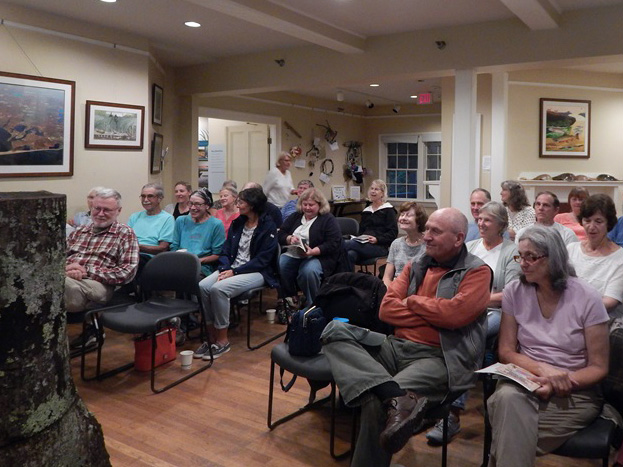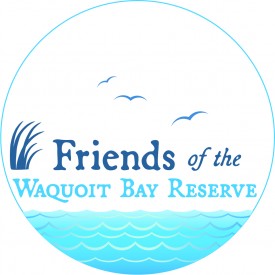Past Presentations

Thank you for visiting the community education past events & workshop materials page. Presentation PDFs and video links are listed below for you to read, view or download. The Community Education Program encourages community members to take advantage of courses, workshops, and other more informal events to broaden their scientific and practical knowledge on topics including estuarine ecology, storm preparedness and resilience, ecological landscaping, organic gardening, energy efficiency, and water quality.
Research at the Reserve 2024
Assessment & Monitoring of Tidal Marsh Bird Populations in the Face of Global Change
Kate Ruskin, University of Maine, and Sophie Barno, Adjunct Professor, Baruch College of Natural
Sciences and Queens College Dept. of Biology
Salt Marsh Migration into Maritime Forests in the Northeast
Andrew Payne, Ph.D. Candidate, Drexel University
What is a Runnel and Can It Help Restore Our Salt Marshes?
Hillary Sullivan, Woodwell Climate Research Center, Ph.D. Candidate, Northeastern University, and NOAA Margaret Davidson Fellow at Waquoit Bay NERR.
Into the SWMP and BayWatchers Meta-Verse?
Theophilos (Theo) Collins, Research associate, Waquoit Bay NERR.
Research at the Reserve 2023
Brook Trout Restoration & Research in the Quashnet River
Steve Hurley, Southeast District Fisheries Manager, Massachusetts Division of Fisheries & Wildlife
Sandplain Grasslands: A Rare Habitat at the Waquoit Bay Headquarters
Dr. Robert Wernerehl, State Botanist, Natural Heritage & Endangered Species Program, Massachusetts Division of Fisheries & Wildlife
Tracking Winter Founder in Waquoit Bay with Nets and DNA
John Logan, Fisheries Biologist, Massachusetts Division of Marine Fisheries
Carbon-based Permeable Reactive Barriers: What does the Future Hold for Curing the Nutrient Problem in Cape Cod’s Estuaries?
Kenneth Foreman, Ph.D., Ecosystems Center, Marine Biological Laboratory
Deoxygenation, Acidification and Warming in Waquoit Bay
Dr. Matthew Long, Associate Scientist, Woods Hole Oceanographic Institution
Research at the Reserve: Home Edition (video links 2022)
What’s in a Sound? Ecoacoustics is the study of natural and manmade sounds and their relationships with the environment over time and space.
Alison Noble, Louisiana Universities Marine Consortium
Shorebirds at Waquoit Bay: Challenges and Successes
Lyra Brenna, Director, MA Audubon Coastal Waterbirds Program
Research at the Reserve: Home Edition (PDF links 2021)
Managing Mosquitos in Marshes
Aubrey Paolino, Entomologist, Cape Cod Mosquito Control Project
Life’s a Beach…For Insects too. Barrier Beaches as Specialized Habitat for Rare Moths
Mark Mello, Research Director, Lloyd Center for the Environment
Recent Trends in Water Quality in Response to Urbanization Across Waquoit Bay Estuaries
Kelsey Chenoweth, Research Assistant, Marine Biological Laboratory
The Underappreciated Rivers of Cape Cod
Max Holmes, Deputy Director and Senior Scientist, Woods Hole Research Center
Microplastics in the Salt Marshes of Waquoit Bay: A Story of Urbanization and Plastic Waste
Javier Lloret, PH.D., Research Scientist, The Ecosystems Center Marine Biological Laboratory
Storm Preparedness & Resilience
What can past hurricanes and nor’easters tell us about our current and future risks? The history of past storms in southeast New England gives us insight into what the future may hold with the backdrop of sea level rise. Hear about forecast capabilities and limitations as well as where to find information when a storm threatens. Learn about measures that can protect you, your family, your pets, and your home.
Hardy homes can help keep you safe and comfortable. What should homeowners and renters be doing now to prepare for the next storm? Learn how to reduce damage to your home and help your family stay warm during power outages and times of extreme conditions. Topics include how to detect issues in your home, generators, solar electric systems with various types of energy storage options and solar hot water.



